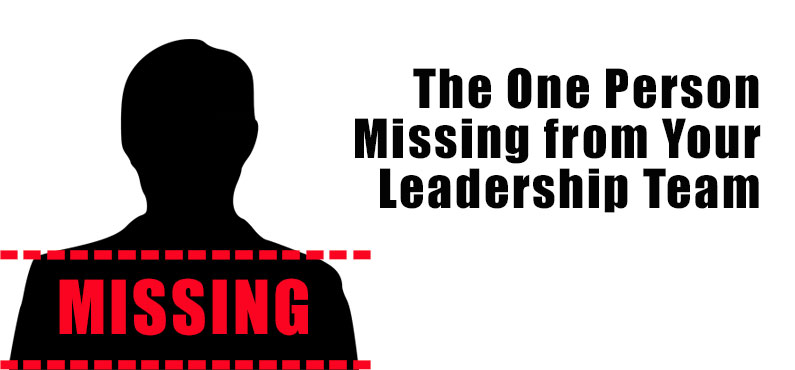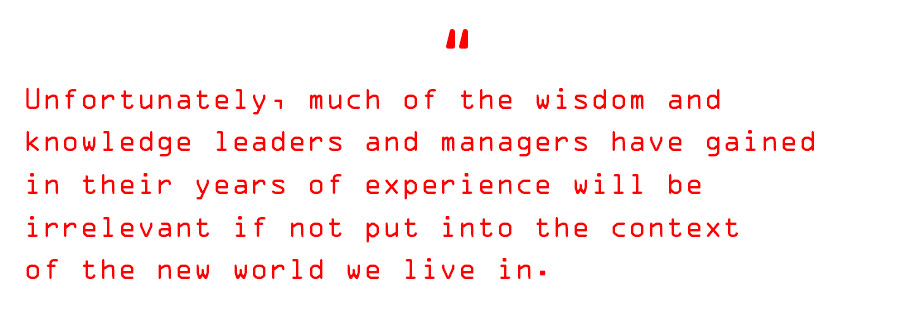The One Person Missing from Your Leadership Team
Let's face it, many businesses and organizations are having trouble finding their way in an era of exponentially accelerating change. The world has changed, and it is changing faster than ever. Organizational leadership is trying everything to remain relevant and solvent. We are all searching for that one thing that will help us thrive or, at least, continue to exist. Unfortunately, we are often looking outside our organization or to specialized staff and departments for that magic solution. However, deep down, we know, that as leaders, we are the ones who will need to lead our organizations into the future.
It Isn’t Working
Some organizations are making an effort: publishing a new website, attempting to have a social media presence, adding new and better software to better reach and engage with members, clients, or customers. Some organizations are adding staff, freelancers, or volunteers that “get” digital, social, and I.T. Others are even investing substantial money in trying to launch strategies around social media, web, and digital marketing. But most of the time it isn’t working.
It isn’t working because it isn’t just an issue of tactics. It is an issue of leadership. The majority of legacy organizations share this one common characteristic: leadership comes through seniority. That makes sense. We need wisdom and experience to lead people forward. But what if we are going places we have never been before? Will wisdom and experience gained from the past lead us forward into the future? Yes and no.
Ask Yourself
If you are a leader in your organization, whether a CEO, VP, owner, or senior management, ask yourself these questions:
- Are you aware that we now live in a world with retired pro gamers?
- Are you familiar with the latest trends in the major social media platforms like Twitter, Facebook, Instagram, Pinterest, and SnapChat?
- How much thinking have you done about the massive shift to content marketing over traditional marketing practices?
- What do you think about the impact of data that shows that most people now use online resources to make decisions about nearly everything, including where to go church?
- Have you experienced the shift to an omnichannel approach to customer engagement in both large and small businesses and organizations?
- Do you have insight into the way that big data, machine learning, and artificial intelligence are changing nearly every aspect of our lives?
- How much thought have you given to how digital natives, those for whom computers have always been a part of daily life, will experience faith, religion, and church?
How Did You Answer?
If you answered yes to most of these questions, you are probably working to keep up with the rapid pace of change in the way our world works.
If those questions sounded like something I just made up, or like I descended into alpha geek world, that’s okay. You don’t need to know about all these things, but someone in leadership should.
Don’t Outsource Your Organization’s Future
I talk to too many leaders who throw their hands in the air when the topic of technology comes up. Some claim that technology and the associated rapidly shifting communications and marketing practices are best left to other people. There are staff members, contractors, specialists, or firms that handle that.
That isn’t going to work anymore. It is not just that technical practices are changing, the world is changing. Unfortunately, much of the wisdom and knowledge leaders and managers have gained in their years of experience will be irrelevant if not put into the context of the new world we live in.
Read that again carefully. It is not that wisdom and knowledge are irrelevant. Those things are as relevant as ever. However, they lose their value if they are not put in the context of the world we now live in.
No longer can we use the same decision making and strategy setting processes and just let the communications and tech people implement them using the latest tools. The strategic decisions themselves must be steeped in the changing dimensions of the world.
Insight into this radical digital paradigm shift needs to be present at all levels of an organization’s decision making, strategic planning, and especially vision casting.
Top leaders are charged to shape the vision of an organization’s future. That is their role. Their wisdom and experience have prepared them for that role. However, if they don’t have a clear picture of what the future (or even the present) looks like, they will have trouble envisioning how their organization moves into that world.
So, What Should Leaders Do?
1. Training and Education
Organizational leaders should stop shrugging off technology and digital communications as something for someone else to worry about. While it is essential to employ experts and specialists to focus on specific tactics, leaders should be trained and educated in the overarching concepts driving modern life. They should no longer live at the mercy of their specialists but rather be prepared to be in conversation with them.
Training is certainly not hard to find. There are plenty of people who can offer training and there is also a wealth of training available online.
2. Inviting New People to the Table
Top level leaders should consider who is at the table as vision is cast and mission is clarified. Again, even for organizations who are ready and willing to embrace new technology and communications practices, it is not enough to blindly map the future and turn it over to “experts” for implementation. It is essential to have conversation partners who are rooted in the rapidly changing modern world.
It is important to not assume that these conversation partners need to be young. An understanding of the changing landscape is not the sole purvue of the young. In fact, some young people are so steeped in modernity, they are virtually unaware of its existence. On the other hand, I have met retired people who are more connected to modern methods and practices than I am.
It is also important to look for the right people. Technical aptitude is not the only characteristic needed to help lead. They are harder to find but there are people who understand tech and communications and also understand vision, mission, and strategy.
This Won’t Be Easy
This will not be an easy transition. Many of us don’t like to be made aware of our limitations. Most senior leaders have worked hard to get where they are. It is difficult to accept that some of our long-held skills and assumptions need to be updated. But this is what leaders do. They lead. And when leaders don’t know how to get to where they are going, they empower others to help get them there.






